When Britain tries to do topical late-night TV: eight-and-a-half examples
For unfussy disciples of US popular culture, which nowadays is pretty much the whole planet, this past week has been an occasion to rank alongside the Oscars or the Olympics. What a shame someone cocked up and scheduled all three for the same month.
Talk about bad timing. Which, not coincidentally, is exactly what the departing host of America’s most famous TV programme has been doing for much of the last decade. Jay Leno leaving the Tonight Show is a big deal. That it’s not the biggest deal in town is only partly the fault of the Academy Awards and the Sochi Games. What is the biggest deal is the fact that Jay Leno is leaving the Tonight Show AGAIN.
He’s had to do what Larry David dubbed a “double goodbye”: having already once said farewell in the worst possible circumstances, he faced the same ordeal over again.
It’s all part of the glorious shambles that is the recent history of the Tonight Show – but a history entirely in keeping with its status as crucible for the most talked-about brouhaha in showbusiness.
If there’s nothing that rings true about any of the preceding paragraphs, it’s because there’s nothing like it in this country. And more’s the pity. We’ve never been blessed with the kind of programme that demands to be watched – and on which the biggest names demand to appear – at bedtime.
We have, however, been cursed with a fair few not-quite-late-enough shows. And in this we have endured the worst of both worlds: programmes that have tried and failed to copy America, and programmes that have simply failed.
Below you’ll find eight-and-a-half attempts by British TV to crack the secret of a successful late night series, each teasing us with flashes of that all-elusive self-sustaining longevity, only to falter and flop like a post-watershed piss-up.
We’ve drawn up two rules.
One: the show had to be on after 9pm. Sadly, this means no Wogan, Ross or Harty. But on the positive side, no Live With Chris Moyles or Johnny Vaughan Tonight.
And two: the show had to be more than once a week. As you’ll see, this almost, but not quite, spares us having to talk about Parky.
“I’m want to give you the bad news first,” said Steve Allen at the start of the Tonight Show’s debut on NBC on 27 September 1954. “This show is gonna go on forever. Boy, you think you’re tired now!” Six decades on, America is still rubbing its eyes expectantly at 11.30pm. If only the same were true here.
In descending order of merit…
8. 24 HOURS
(BBC1, October 1965-July 1972)
America had Johnny Carson to wish it goodnight in the 60s. We had Cliff Michelmore. If only Cliff, like Johnny, had stayed behind his desk right through to 1992. For here was Britain’s first, and best, wind-down merchant. On 24 Hours, Cliff took the authoritative but convivial schtick he’d essayed on the Tonight programme – as reassuring and hardwearing a teatime fixture as your mum’s kitchen pots – and recast it as something as functional yet soothing on your palate as an after-hours mint.
The time slot wandered about for a bit, until landing at 9.55pm in 1967 to steal a five-minute lead on ITN’s News at Ten. We know which one we’d have tuned in for.
The light channel may have had the heavyweights, but the Beeb had the lighter touch. 24 Hours hopped with relish between avuncular discussion, live votes from the Commons, breaking news from the US, newspaper reviews and topical skits, besides sporting a guest policy elastic enough to stretch from people who could read backwards to the premier of China.
On the night the Post Office Tower opened, the team broadcast live from a party at the very top. Some of the rude daubings left on windows by intoxicated staff members exist to this day. 24 Hours could have evolved into the biggest show of the 70s. Instead David Dimbleby took over and, just like he’d do 10 years later with Nationwide, swapped tonic for gruel. Lesson one: never serve up something indigestible last thing at night. At least Cliff was canny enough to have the last word of all.
7. LATE NIGHT LINE-UP
(BBC2, September 1964-December 1972)
A show that spent part of its very first week on air doing the history of Radio Times was always likely to be remembered fondly – if not by the viewing millions, then by the enthusiastic several who salivate at the idea there was once a programme that had Margaret Rutherford, Burl Ives and Arnold Ridley all in the same week.
Or Tim Buckley, Cicely Courtneidge and Kingsley Martin on the same night.
Fans of live, late topical shows on the BBC were truly spoiled in the late 60s. After a slice of Michelmore, you could turn over for an open-ended helping of Sheridan Morley, Joan Bakewell, Tony Bilbow and co munching on counter-cultural cud with whoever was still hanging around TV Centre once the bar closed.
Some of it must have been ghastly: Yoko Ono and Malcolm Muggeridge on the same bill; any number of earnest discussions of “happenings”.
But a week in the life of Kenny Everett? A chat with Benjamin Britten and Billy Cotton? Hundreds of “last ever interviews” or “first ever performances?” David Attenborough dropping by to put his feet up after another day running BBC2?
We’d never have gone to bed.
6. THE LATE SHOW
(BBC2, January 1989-June 1995)
What did we think of this programme’s insightful, fresh and fun take on the arts, media and popular entertainment? We’d have welcomed it.
Fridays were decent enough to begin with, while Clive James was host. Then he fell out with Alan Yentob over how many women he should have on as guests, and quit to spend more time with his clips of Stormin’ Norman Schwarzkopf. We were left with Tracey MacLeod, Michael Ignatieff and Sarah Dunant: three of the most intelligent people on television, but also the least intelligible. This non-brio trio, one of whom went on to be leader of the opposition in Canada, rotated nightly but sadly not fast enough to create even a wisp of passion to disturb the studio’s arid air.
This was a show that thought it was a good idea to do a spoof Juke Box Jury featuring recordings of Beethoven’s 9th symphony, to devote not one but two editions profiling the redevelopment of Stansted airport, and – most heinous of all – to launch Mark Lawson’s TV career. Because of that, and despite any number of classy guests, live music and being gatecrashed by Lenny Henry during Comic Relief Night in 1989, it can never be forgiven.
5. TONIGHT
(BBC1, September 1975-July 1979)
Having ditched 24 Hours after Dimbleby knackered it, the Beeb replaced it first with Midweek: a show that, like its title, was neither one thing nor the other. When this also flopped, someone decided to dig out an old teatime treat from the back of the cake cupboard. Only the lid hadn’t been properly screwed on, and its contents had gone off.
Granted, Tonight Mark II had precious few good stories to tell – the rest were all nicked by Nationwide. Plus once a week you’d get, in capital letters, The Ludovic Kennedy Interview. Still, even that was preferable to Melvyn Bragg interviewing Oswald Mosley about antisemitism, or recreations of the Northern Ireland Troubles using Action Men dolls.
Sue Lawley got out as soon as she could, leaving Denis Tuohy and John Timpson to pass hosting duties between them like a leaky bin bag. Eventually BBC1 controller Bill Cotton decided the nation needed a smile and a song to send it to bed. Instead what it got was…
4. PARKINSON
(BBC1, September 1979-April 1982)
It’s not often we find ourselves siding with Robin Day against Bill Cotton, but on this occasion the old bugalugs called it right.
Bill wanted Michael Parkinson’s Saturday show, running since 1971, to air five nights a week. Sir Robin, and the BBC governors, disagreed.
Topical entertainment of the Carson kind had no place on BBC1, they said. What they meant to say was topical entertainment of the Parky kind had no place on BBC1. The thought of Mike trying to do an opening monologue of zingers about “prices” or “that bloody bird” every weeknight was grisly enough to make even substitute show Question Time – with a crowing Sir Robin in the chair – seem preferable.
Cotton still had gaps in his schedule, however, so Parky was tossed the bone of a Wednesday night “serious” talk show to rub alongside his ongoing Saturday night snorefest. Both came to an end when Mike, not for the last time, defected to ITV in order to moan about the BBC while getting filthy rich.
For his part, Cotton didn’t let up and a few years later tried to woo Wogan for the same five-nightly gig. “That’s too late for my Radio 2 audience,” snapped Tel. What, and 7pm wasn’t?
3. V GRAHAM NORTON
(Channel 4, May 2002-December 2003)
This had the high-profile guests and the blessing of a permanent slot in the schedules. But it was almost all pitched on one note, and that note was very high and very loud.
V Graham Norton could make glitter come out of your set, but only if fired from Cape Canaveral. Being shouted at tactically is one thing; being bellowed at lazily, even if it’s being done with Grace Jones or Ruby Wax next to you on the sofa, is not entertainment.
Graham’s more reticent guests – your Nigel Havers and your Peter Davidsons – always looked thrown by the show’s format, while Graham himself seemed panicked whenever the star count swelled from one to two. Few could make the prospect of interviewing Brian Capron and Jane Birkin feel like a task of Sisyphusian ordure. Graham did.
Weekly outings to New York and Los Angeles at least made for a change of scene, if not tone. And the daily turnover of guests was bracingly unfussy: Monica Lewinsky one night, Mark Owen the next. But you could never get purchase on this show. The comedy phone calls rang particularly hollow. A case of too many handsets, not enough heft.
2. THE JACK DOCHERTY SHOW
(Channel 5, March 1997-June 1999)
“We ran out of guests,” offered the host in lieu of a coroner’s verdict. He was half right. More accurately, The Jack Docherty Show ran out of guests who wanted to appear. Promoted as the jewel in the navel of Britain’s newest network, within months it became the grit in the eye. A roving eye at that; the Friday edition got dropped for episodes of La Femme Nikita.
A bit like Hitler’s annexation of the Sudetenland, the show was simply and brutally squashed out of existence to be replaced by lots of leather and shouting.
By September 1997 it was down to four nights a week; by April 1998 three; by November 1998 two; and by the time of its demise just one. Bookending its existence like two nonplussed tentpoles were appearances from Roger Moore and Michael Aspel. Other nights you were lucky if you got Steve Punt.
The biggest problem, however, was the tone of the thing. The show was taped early evening in a poky West End theatre (now the Trafalgar Studios) then broadcast “as live” at 11pm. Atmosphere fled out of the premises from day one. Star guests did likewise from day two. Ultimately its host followed suit, disappearing for weeks on end while the likes of Dr Fox and Melinda Messenger held court. When it died, no one rejoiced, because no one cared.
But The Jack Docherty Show isn’t quite the worst series on our list. By virtue of its miniscule budget and scant self-regard, it ranks one place behind…
1. THE 11 O’CLOCK SHOW
(Channel 4, September 1998-December 2000)
Iain Lee approaches a woman in the street to do a “comedy” vox pop. “Do you believe in life… after love?” he asks. She looks nonplussed, then terrified, then out of politeness gives a small chuckle. She is the only one in the nation to do so.
Most of the programmes in this list managed to get right at least one of the ingredients of late night TV. The 11 O’Clock Show failed to achieve even that. It was a classic Channel 4 flop: when it went wrong, which was very quickly, money was thrown at it, which was a lot, and the presenters were changed, who got sequentially awful.
Any jokes surfaced in spite of not because of the format. The show had to signal the end of its “funny” news-in-brief section by announcing “that’s the end of the news in brief”, because it never finished on a funny enough line to generate spontaneous applause. None of its stars were people you’d ever choose to spend time with, let alone – as David Letterman once said in praise of Johnny Carson – be tucked in at night by.
C4 boss Michael Jackson stuck with it for a couple of years, as he was the one who’d come up with The Late Show for BBC2 and was loathe to have two late night turkeys on his CV. But even he accepted the last revamp, swapping the ghastly Iain Lee and Daisy Donovan for the rotten Jon Holmes and Sarah Alexander, was laughable (ironic, given that nothing else had been) and that it was time, finally, to stop the Clock.
Special mention for…
THE RDA (60 editions during 2000 and 2001)
This is a tale of a show undermined by its own over-ambition, but fantastically so.
About the only thing worth remembering of digital channel BBC Choice, The RDA revelled in its shoestring budget, down-at-heel feel and love of amateurism. No pretence here; host John Gordillo made a virtue of his inexperience as well as the show’s lamentable choice of guests, frequently botched stunts and lacklustre gags.
And yet, by the end of its short life, it had become one of the best shows on television. This was thanks both to its imagination – no nook of BBC TV Centre was left unmilked for its comedy potential – and its unabashed determination to make the best of the worst of all possible worlds.
It became a show about the making of a nightly topical TV show, but not in a crass, uber-arch way, rather one that was shamelessly honest and infectiously fun.
A typical episode saw Gordillo ring up the BBC duty log to lodge a complaint about his own show. Or taking the studio crew (and us) for a coffee to avoid watching a musical number by Bonnie Langford. Or spying on Huw Edwards leaving TV Centre after each day’s Six O’Clock News, until – wonderfully – the tables were turned. Or exploiting whatever big event the Beeb were covering that day, be it the London mayoral election or Eurovision. Or mounting OBs from wherever would have him, from the Royal Albert Hall to the set of East Midlands Today.
Taped as live at 7pm then transmitted a few hours later, the RDA was everything a British late night hit show could and should be… except popular. With a bigger profile and much larger TV audience, things may have been different. But then so would the show, and Gordillo’s foibles might have been transformed from boon to boondoggle.
Maybe one day – or better still one night – we’ll see its like again. As Michael Jackson instructed Paul McCartney on The Girl is Mine: you keep dreamin’.




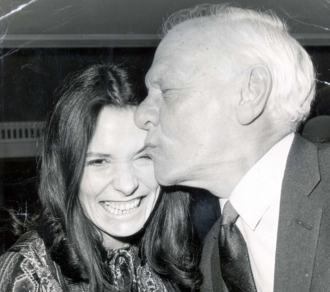
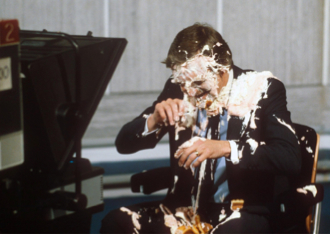


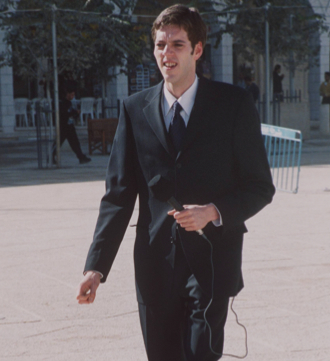
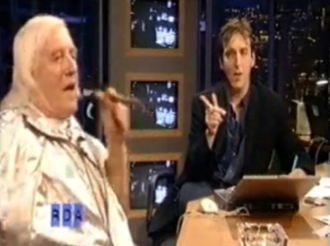


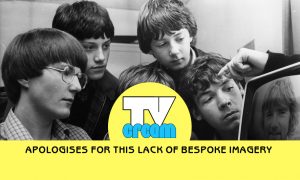















Quincy ME
February 9, 2014 at 9:00 pm
I have no idea who Jon Holmes is and having looked at his Wiki page I can only assume he wrote it himself.
I still have no idea who he is though.
….and Letterman, Leno, Ferguson, Fallon etc are all terminally unfunny.
Robert
February 9, 2014 at 10:10 pm
Would like to see Danny Baker given another chance to host a show like this. BBC2, after Newsnight.
lee
February 9, 2014 at 10:21 pm
To be fair though, the 11 O’clock Show did give the world Ricky Gervais and Sacha Baron Cohen.
Richard16378
February 9, 2014 at 10:50 pm
No mention of Ali G on the 11 O’Clock show?
I guess Danny Baker’s 1990s show on BBC doesn’t count, I think it was once a week.
Simon Greenwood
February 9, 2014 at 11:00 pm
The one that immediately came to mind when I read this was Danny Baker After All. If anyone could take the US late show format and put a British spin on it, it would be Dan and his love of all things American. The problem was, he took an American late show format – David Letterman’s pretty much – and duplicated it, which wouldn’t work because it’s not what we expect at 11pm on a Saturday night. Had it been daily it might have had something but I don’t think Dan had the patience to script a daily show, which isn’t how he works at all. The Album Show on BBC4 nearly had it right, a freewheeling, open ended conversation could be brilliant, but they had still had to have the scripted links to keep it in line. It probably couldn’t happen now, when the Daily Show has a following for semi-relevant satire of the type but no-one can find an hour for the bonhomie of last night’s Letterman, and we couldn’t do it here any more, certainly not the BBC and not any channel with an eye on ad revenue.
Aaron
February 10, 2014 at 2:01 am
You’ve missed an important point here, or at least what I think is an important point: Britain may have no late night talk shows, but America has no comedy panel game shows, a genre with which I am unhealthily obsessed. You might kill for a show like The Tonight Show, but I (an American) would kill for a show like Have I Got News For You.
As for Jay Leno, mark my words, he’ll be back on NBC by the end of 2014.
Adrian
February 10, 2014 at 8:12 am
What about that chat show that Harold Wilson chaired, or was that not a late night show?
TV Cream
February 10, 2014 at 7:30 pm
Harold Wilson’s show – Friday Night, Saturday Morning – was broadcast only once a week.
The post-Newsnight slot would be ideal for a nightly topical show, if not from Broadcasting House then maybe the BBC studios in Salford. It might flop but it’d be great to at least see someone try.
Richard16378
February 10, 2014 at 8:57 pm
It’s a shame there is a more than once a week rule, as this rules out a few memorable shows like Saturday Night Clive, Clive Anderson All Talk etc.
THX 1139
February 11, 2014 at 8:44 pm
Great to see The RDA mentioned, because it was a really British take on the American phenomenon and got away with murder because hardly anyone was watching. The last ever sequence they showed was a spoof of the final scene in Schindler’s List! Cosmos Transmutazoid was the sort of guest no one else would have on (“I will destroy you!”) and I love the idea of a hundred million people watching Eurovision and wondering why that girl presenting her country’s scores just grabbed and waggled her ear (what was her name? Moicza or something? From… Macedonia, perhaps?).
Richard16378
February 11, 2014 at 9:51 pm
I’ve often heard that Johnny Carson & Jay Leno (& I guess many other late night hosts) had a team of top comedy writers to keep them stocked up with gags for 5 shows a week.
Danny Baker After All had the novelty of a sliding door & cityscape background which was close to the set of David Letterman’s show.
I do wonder why NBC have got rid of Jay Leno twice, especially the 1st time when he was getting good ratings & they gambled on this dipping over 5 years while his contract ran out.
If things go pear-shaped for Jimmy Fallin it will be a lot harder to sort things out, as Jay won’t be doing another regular show on NBC & the Tonight Show will be moving to New York.
Steve
February 12, 2014 at 2:48 pm
@Richard16378
Leno was ‘retired last time, as NBC were scared of losing Conan O’Brien to another channel. Conan was in the Jimmy Fallon slot. Leno was not particularly happy about that. He was the top rated late night show.(and still was till the end) NBC have Leno a 10pm talk show a few nights a week, which basically screwed Conan. Ratings were down at NBC, and with the lack of primetime hits, NBC panicked. They saw their late night cash cow going.
In the end they tried to have Jay on at 11pm , then Conan at 12am. Conan refused (and I would think there would have been a lot of trouble with the local stations who run their news at that time). Conan left for TBS, where he still is now.
They have kept Leno in the loop on this one, so he isn’t coming back.
Going to be interesting for Fallon. As mentioned, Jon Stewart starts at 11pm, Jimmy Kimmel at 11.30pm, Conan at 11.00pm. All trying to grab a share of a big advertising pile. And of course Letterman, who in my opinion, is still the best of them all.
I say this from someone in the UK. Bring back ‘The RDA’
Richard16378
February 13, 2014 at 1:33 pm
OK I see, Mark Evaniner’s site http://www.newsfromme.com/ has some good comments on the situation.
One being that Conan was struggling in the ratings even before Jay’s prime time show started up.
Anthony
April 11, 2016 at 12:49 am
I remember in the seventies and catching it accidentally as a toddler when I should have been asleep lol! Friday Night Saturday Morning on BBC-2;it was a kind of late night arts and culture programme, usually after NewsNight ended until closedown at 12.30am with the revolving 2 symbol and closedown montage of images and music leading to black and the familiar high pitched off air test tone.